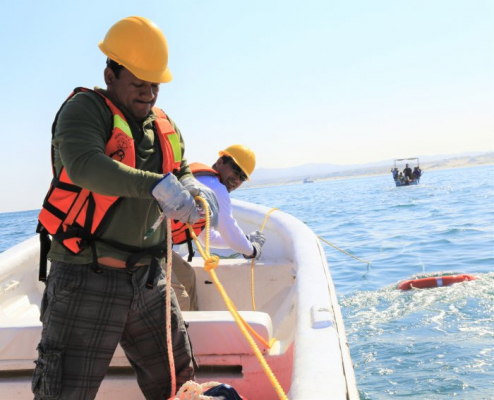IWC entanglement response training for northern Peru
The latest IWC entanglement response training has concluded successfully in Los Organos, Peru. Conducted in partnership with the Center for Coastal Studies (CCS), Provincetown, the training is offered to help build safe and effective response capability around the world.
Entanglements, of humpback whales in particular, have been increasing along this coast, and the fishermen were eager for a solution, and barring that, training on how to release whales entangled in their nets.
Over 700 people have now received IWC entanglement response training. Their backgrounds vary hugely and this diversity was reflected in the Los Organos workshop. It was requested by a fishermen’s cooperative in San Jose and a non-governmental organisation, Prodelphinus, who then worked with the Instituto del Mar del Peru (IMARPE) and local businesses in Los Organos, to facilitate and support the two day training.
Prodelphinus worked hard to ensure a wide range of stakeholders were involved and a group of fifty seven trainees attended, a mix of fishers, IMARPE staff, Navy, NGO personnel and local stakeholders, including whalewatch operators. For the practical training, boats were supplied by the local whale watch company, Pacifico Adventures, and the workshop was endorsed by the Ministry of Foreign Affairs.
This workshop was the second opportunity to advance the recent initiative to “train the trainer.” IWC trainer David Mattila was assisted by Karel Beets from Mexico’s entanglement response network (RABEN). Karel had completed an apprenticeship in the summer of 2015, which was supported by CCS and World Animal Protection. One of the goals was that he, and fellow apprentice Ricky Rebolledo, would become the IWC’s first Spanish-speaking trainers. Karel did a great job and received high praise from the trainees.
For photographs of the Peru training, and other entanglement workshops, click here

